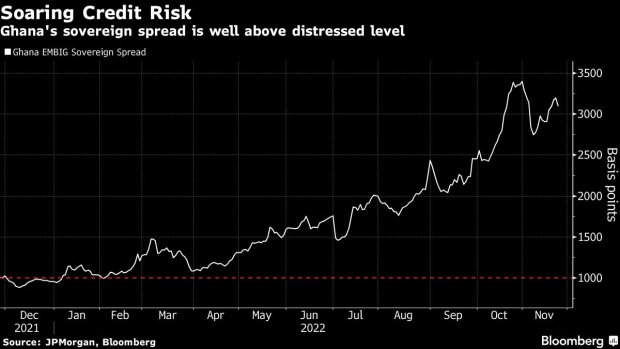Nov 25, 2022
Ghana Needs Fidelity, Goldman More Than Ever as Crisis Deepens
, Bloomberg News

(Bloomberg) -- Ghana has the world’s worst-performing currency, inflation at 40% and its debt is junk. As it struggles to get to grips with a rapidly deteriorating situation, it’s now asking bondholders to accept losses on their investment.
The government aims to start talks with investors before the end of the month. It’s hired Lazard Ltd., Global Sovereign Advisory and Hogan Lovells US LLP as advisers, Reuters reported earlier this month. Some bondholders have tapped Rothschild & Co and Orrick, Herrington & Sutcliffe LLP as advisers, the Wall Street Journal reported.
Fidelity Institutional Asset Management, Goldman Sachs Group Inc and Pimco top the list of publicly-announced holdings of Ghana’s dollar-denominated bonds, which lost half of their value this year, according to data compiled by Bloomberg.
As part of any restructuring, Ghana will probably have to agree to tough measures to get its finances in order. But that’s a price it will have to pay to get a deal through and move it a step closer to a crucial bailout. It’s been in negotiations with the International Monetary Fund since September about a $3 billion program after being shut out of international debt markets.
“A harsh restructuring can only be accepted if there’s also a credible and strict fiscal adjustment,” said Carlos de Sousa, a portfolio manager at Vontobel Asset Management in Zurich, which holds Ghana debt. “If the government proposes a harsh restructuring but a soft fiscal adjustment that will be perceived as putting the burden on creditors.”
Boston-based Fidelity holds $94.5 million of Ghana’s dollar bonds, followed by Goldman Sachs Group Inc. at $72.2 million and Pimco with $68.5 million, according to data compiled by Bloomberg. A London-based spokeswoman for Pimco declined to comment. Fidelity and Goldman Sachs did not immediately return emails seeking comments.
While there are specific reasons behind Ghana’s collapse, it’s also another warning from the world of emerging markets, where economies are struggling to recover from the pandemic, or facing pressure on debt payments because of the strong US dollar.
Ghana’s cedi is down almost 60% this year, the worst performance of any currency. Other big losers include the Sri Lankan rupee, Argentina’s peso and Turkish lira, all of which are facing balance-of-payments problems.
One issue for Ghana’s government is credibility, as the decision to seek a haircut on foreign bonds comes just weeks after President Nana Akufo-Addo said the bailout talks wouldn’t result in losses for holders of external debt.
The country’s debt trades at a yield of 3,115 basis points over US Treasuries, the highest among African nations after Zambia, which has already defaulted. The average yield on Ghana’s debt hit a record high of 38.6% at the end of October from less than 11% at the end of last year.
The IMF estimates Ghana’s debt-to-GDP to surge to 90.7% this year from 31.3% in 2011. The country must repay $3.5 billion in loans and bonds next year, according to data compiled by Bloomberg.
The bonds were steady on Friday, with the yield on 2032 dollar securities falling 68 basis points to 30.29%, according to Bloomberg generic pricing. That suggests investors weren’t unprepared for a restructuring announcement.
‘Dose of Realism’
“I think the markets may end up welcoming this dose of realism from Accra – especially as it will help bring the IMF on board,” Charlie Robertson, global chief economist at Renaissance Capital, said in an email. “It built up debt due to excessively large deficits -- budget and current account -- for many years, and avoiding this would have required stringent austerity in 2021 and an IMF deal then.”
In a bid to calm any investor nerves, Deputy Finance Minister John Kumah indicated the government won’t try to force anything on them.
“We know our bondholders, it’s not like it’s a big market out there,” he told Joy Fm radio in Accra on Thursday. “So it’s a matter of just constructing discussion and seeing how best we can all come to a position that protects either side and save the economy.”
(Updates with details of holders, debt ratios from sixth paragraph)
©2022 Bloomberg L.P.





